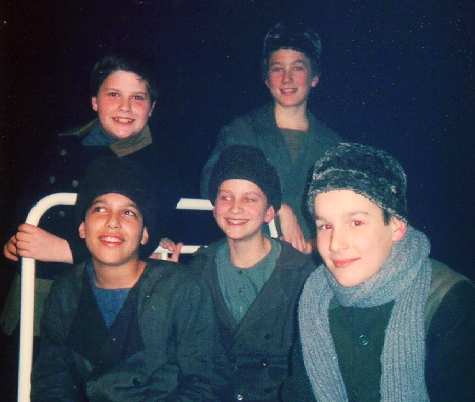|
<< -- 3 -- Roderic Dunnett The role of the artist

Certainly the opera stands in the long and honoured line of operas dealing
openly and directly (many deal indirectly) with the role of the artist (Der
ferne Klang, Mathis der Maler, Palestrina, Maxwell Davies's
Taverner - not to mention Capriccio). Do we warm to Lenz's
ravings, as we empathise with Pfitzner's papally-beset Palestrina? Well,
yes, in parts. What we yearn for is, first, some lighter angle or comic
diversion (a more wizened composer might have tinged it with shades of Falstaff).
Michel Deutsch's attractively framed production was simply but sympathetically
set by Roland Deville : a tub, a few barrels, a bed, enough to make Deborah
Warner look cluttered, and shrewdly pin-pointed by Hervé Audibert's
lighting (the creeping horizontal light near the end was a masterstroke);
and second, more of what Rihm's interludes palpably supply : some relief
and let-up from Lenz's (and certainly from this energetic Lenz, Johannes
Kösters's) eternal headbanging. His dialectic would exhaust Hegel or
outwit Schopenhauer. As self-crucifying goes, he does a pretty thorough
job.

Rihm nails his Modernist colours to the mast : Jakob Lenz starts
where Wozzeck left off, with the innocent song the children are singing
at the close of Berg's opera. The guttural opening 'Ringe, ringe. Rosenkranz',
sung by a clutch of shrewd young singers from La Maîtrise de Caen
(an outstanding boys' choir attached to the city and regional Conservatoire,
directed by Robert Weddle), was the point from which Jakob Lenz succeeded,
for so striking and galvanising was this opening that the opera, in a sense,
never looked back. Rihm casts his adult chorus as solo lines (six singers);
every choir entry was bracing, and the a cappella section towards
Lenz's demise was especially arresting. The interaction of the two, boys'
chorus and main sextet -- a visual relief from the sight of Lenz's ubiquitous
greatcoat, a kind of Sturm und Drang mackintosh (all he needed was
gumboots and an umbrella -- and sure enough, finally, down came the rain
to intensify and then douse the emotions) was consistently well staged by
Deutsch.
Continue >>
Copyright © 10 March 2002
Roderic Dunnett, Coventry, UK
 << Music
& Vision home
L'Amico Fritz >>
<< Music
& Vision home
L'Amico Fritz >>
|

